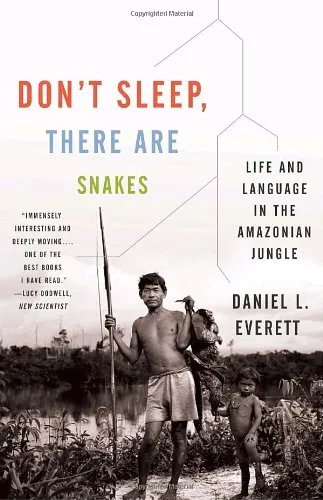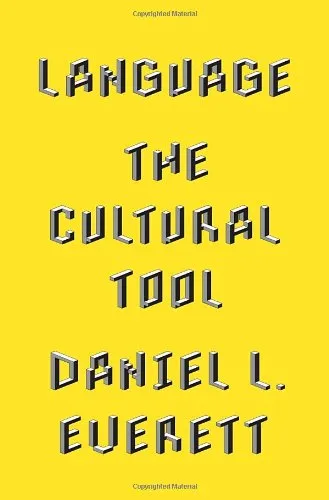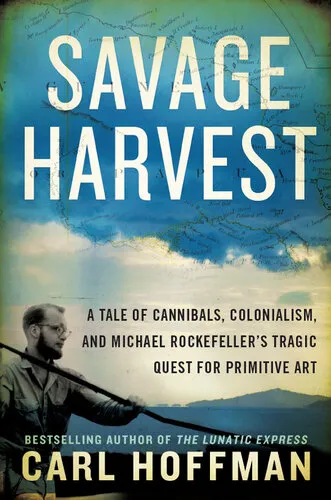Don't Sleep, There Are Snakes: Life and Language in the Amazonian Jungle
4.0
بر اساس نظر کاربران

شما میتونید سوالاتتون در باره کتاب رو از هوش مصنوعیش بعد از ورود بپرسید
هر دانلود یا پرسش از هوش مصنوعی 2 امتیاز لازم دارد، برای بدست آوردن امتیاز رایگان، به صفحه ی راهنمای امتیازات سر بزنید و یک سری کار ارزشمند انجام بدینکتاب های مرتبط:
خلاصهای جامع از کتاب
کتاب Don't Sleep, There Are Snakes: Life and Language in the Amazonian Jungle داستانی واقعی از زندگی و تجربههای دانیل ال. اورت در میان قبیلهای کوچکی به نام پیراها در جنگلهای آمازون را بازگو میکند. اثر به طور مفصل به تجربیات و تحقیقاتی که اورت در این محیط دورافتاده انجام داده، میپردازد. سفر وی به این جنگلها در راستای مطالعه زبانی خاص بود که ساختار و قواعد زبانشناسی متداول را به چالش میکشید. کتاب نه تنها نگاهی عمیق به زبان پیراها دارد، بلکه به تجربیات فرهنگی، اجتماعی و انسانی یک جامعه بومی پرداخته است.
نکات کلیدی
- تحول در تفکر زبانشناسی و چالش با نظریههای معروف همچون Universal Grammar.
- بررسی عمیق چگونگی ارتباط میان زبان و فرهنگ یک جامعه.
- مشاهده دنیای پیراها و تفاوتهای فرهنگی عمیق با دنیای مدرن.
- تجربه شخصی اورت از زندگی در شرایطی که به کلی متفاوت از زندگی شهری و مدرن است.
نقلقولهای معروف از کتاب
"زبان پیراها نه تنها یک زبان بلکه دریچهای بینظیر به شیوهٔ فکر و زندگی این جامعه است."
"برای فهمیدن زبان باید ابتدا فرهنگ را درک کنیم."
چرا این کتاب مهم است
کتاب Don't Sleep, There Are Snakes به دلایل متعددی اهمیت دارد. نخست اینکه یک دیدگاه نوین و بنیادی در حوزه زبانشناسی ارائه میدهد و نظریههای قبلی را به چالش میکشد. دانیل ال. اورت با مشاهده دقیق و مستند خود به این نتیجه رسید که زبان و فرهنگ پیراها از مدلهای جهانی زبانشناسی کلاسیک پیروی نمیکنند. این یافتهها نشاندهنده این است که زبان یک پدیده محلی و فرهنگی نیز هست و نمیتوان آن را تنها از منظر علمی و ساختاری بررسی کرد.
همچنین، این کتاب به خواننده فرصت میدهد تا یک سفر بینظیر به نقطهای دورافتاده از جهان داشته باشد و با جامعهای با فرهنگ و دیدگاههای کاملاً متفاوت آشنا شود. این تجربه فرهنگی برای هر فردی میتواند الهامبخش و آموزنده باشد، چرا که نشاندهنده تنوع و غنای فرهنگی جهان است.
Introduction to 'Don't Sleep, There Are Snakes: Life and Language in the Amazonian Jungle'
Daniel L. Everett’s "Don't Sleep, There Are Snakes: Life and Language in the Amazonian Jungle" is an extraordinary account of the author’s experiences living among the Pirahã people of the Amazon rainforest. This captivating narrative explores the intersection of language, culture, and human cognition, offering unique insights into a society seemingly untouched by the modern complexities that shape the lives of many.
Detailed Summary of the Book
Daniel Everett, a former missionary turned linguistic anthropologist, embarked on a journey to study the little-known Pirahã people as part of his missionary work with the Summer Institute of Linguistics. However, he soon found himself immersed in a world that challenged and ultimately redirected his understanding of language and culture. The book delves into his profound realizations and observations over multiple decades.
The Pirahã are a small indigenous tribe residing along the Maici River in Brazil. They have maintained a way of life that remains largely unchanged by outside influences. What makes the Pirahã exceptionally fascinating to linguists like Everett is their language, which defies many universal linguistic theories. This language lacks recursion—a fundamental property believed to be inherent to all human languages—which sparked widespread debate within the linguistic community.
Throughout the narrative, Everett shares vivid stories of life in the Amazon, highlighting both the challenges and the deep connections he developed with the Pirahã. His encounters illustrate a detailed tapestry of their culture, which operates on principles vastly different from Western norms. The Pirahãs’ unique relationship with time and knowledge profoundly impacted Everett's perspective, prompting him to reevaluate his previous beliefs about linguistics and human nature.
Key Takeaways
- Language and culture are deeply interconnected, challenging prevailing theories of linguistic universality.
- Understanding diverse worldviews is crucial for broadening our perspectives on what it means to be human.
- Everett’s experiences underscore the importance of embracing cultural relativity and the limitations of imposing external beliefs on indigenous cultures.
These takeaways provide a profound exploration of how the Pirahã people redefine commonplace assumptions about language and society, urging readers to reconsider the intricacies of human cognition and communication.
Famous Quotes from the Book
Here are some insightful quotes from "Don't Sleep, There Are Snakes" that encapsulate Everett's thought-provoking journey:
"The Pirahã not only do not have a word for worry, they also don't understand the concept of worry."
"Their happiness is simple. Their life is free of the clutter of interpretive meaning above what is immediately before them."
"I have learned the importance of living for the here and now, and much about the nature of happiness."
Why This Book Matters
"Don't Sleep, There Are Snakes" stands as a significant contribution to both anthropology and linguistics due to its compelling narrative and its challenge to established linguistic theories. Everett's work inspired a lively scholarly debate about the nature of human language and cognition, particularly with his claims surrounding the absence of recursion in Pirahã. Furthermore, the book serves as a poignant reminder of the immense diversity of human cultures and the necessity of approaching them with an open mind and humility.
Beyond academic circles, Everett’s story reaches a broader audience by humanizing the complex dynamics of cultural exchange and understanding. It emphasizes the transformative potential of stepping beyond one’s own beliefs and immersing oneself in the authentic traditions and lifestyles of communities like the Pirahã.
دانلود رایگان مستقیم
شما میتونید سوالاتتون در باره کتاب رو از هوش مصنوعیش بعد از ورود بپرسید
دسترسی به کتابها از طریق پلتفرمهای قانونی و کتابخانههای عمومی نه تنها از حقوق نویسندگان و ناشران حمایت میکند، بلکه به پایداری فرهنگ کتابخوانی نیز کمک میرساند. پیش از دانلود، لحظهای به بررسی این گزینهها فکر کنید.
این کتاب رو در پلتفرم های دیگه ببینید
WorldCat به شما کمک میکنه تا کتاب ها رو در کتابخانه های سراسر دنیا پیدا کنید
امتیازها، نظرات تخصصی و صحبت ها درباره کتاب را در Goodreads ببینید
کتابهای کمیاب یا دست دوم را در AbeBooks پیدا کنید و بخرید
1425
بازدید4.0
امتیاز0
نظر98%
رضایتنظرات:
4.0
بر اساس 0 نظر کاربران
Questions & Answers
Ask questions about this book or help others by answering
No questions yet. Be the first to ask!











